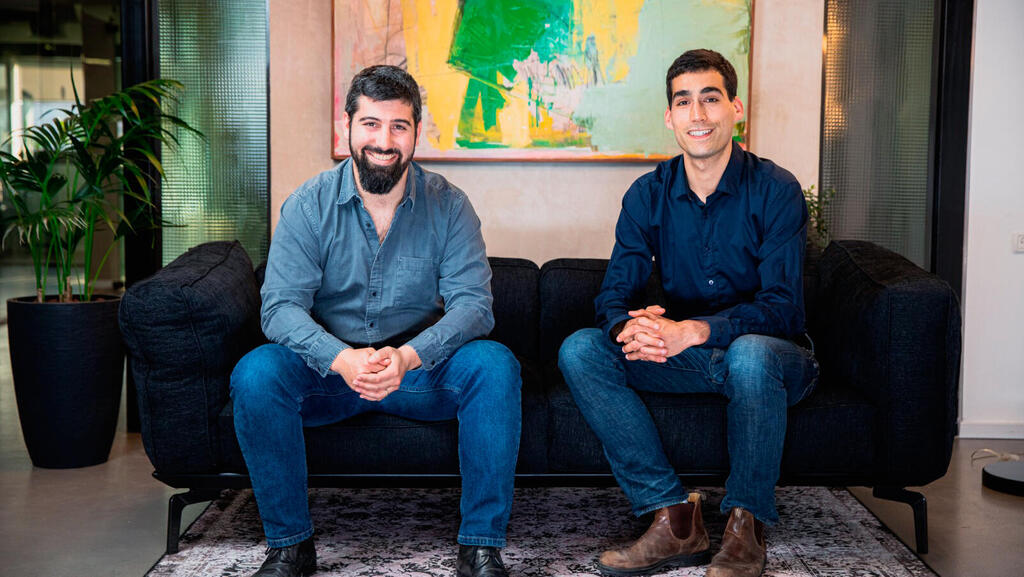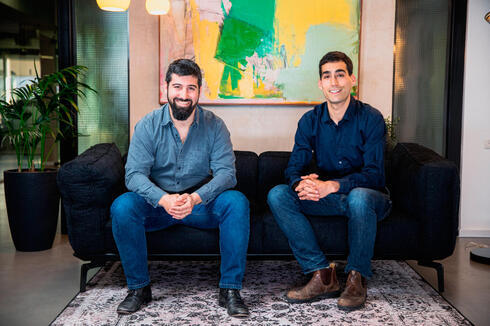
"A return to the good years": How FOMO is driving a new Israeli tech boom
Foreign funds and serial founders fuel multi-billion-dollar raises, defying conflict and crisis.
There are few paradoxes as striking as that of Kaplan Street in Tel Aviv, which has become the focal point of the struggle for Israeli democracy in recent years. On one side stand the Da Vinci Towers, the eastern tower still visibly damaged, with window frames dangling precariously, as if the Iranian ballistic missile that struck it had landed only yesterday rather than a month ago. On the other side, in the Sarona complex, home to many venture capital funds and high-tech companies, business is not merely back to normal, but better than ever. Much better.
Industry insiders are already saying that 2025 is starting to resemble 2020, the year of the coronavirus pandemic, which, surprisingly, turned out to be one of the strongest years ever for Israeli high-tech. Israeli tech is not yet back to the peak of 2021, but there are clear signs that momentum is building once again. This is especially remarkable given that Israel has been engaged in war for almost two years, and persistent attempts at a political coup in the background. Although the high-tech job market appears to send negative signals, almost every other indicator is surprisingly positive.
One serial entrepreneur who recently switched sides to join the venture capital world admits he was stunned by the number of offers he received from American VC firms asking him to open Israeli offices for them. Indeed, during the last 18 months, arguably among the most difficult in Israel’s history, branches of major funds such as Index Ventures, Founders Fund, Greylock, General Catalyst, and others have launched local operations.
Mega-rounds are also making a comeback: in the first half of 2025 alone, there were 13 funding rounds exceeding $100 million each, raising a total of $4.7 billion, more than the total raised during the first half of 2024. This figure includes the enormous $2 billion round for Safe Superintelligence, led by OpenAI veteran Ilya Sutskever, though whether Safe can truly be considered an Israeli company remains unclear. Even excluding that, the numbers are impressive: Cyera and Rapyd each raised half a billion dollars, while cybersecurity companies Cato and Island raised around $250 million each.
The concept of the “super-seed” has also returned, huge initial funding rounds in the tens of millions, sometimes granted without so much as a pitch deck. It seems foreign investors are not waiting for the wars to end; they want a piece of Startup Nation before the next boom erupts.
“The coffee shops are once again packed with entrepreneurs and potential investors to an astonishing degree,” says Fiona Darmon, a founding partner at Sunvest, a fund specializing in secondary deals. “It’s surprising, but not really. On one hand, people have short memories. On the other, history shows a clear link between crises and innovation. After the Great Depression in the U.S., innovation soared, and again after World War II. We saw the same tech boom during COVID-19, and it’s happening now in Israel. U.S. and European funds see what’s brewing here, the sheer number of ideas about to become startups, and they want to be close to the action. Historically, Israeli startups turned to global funds at later stages, but today, that’s no longer a given.”
Yanai Oron, managing partner at Vertex Ventures, has also noticed the Israeli scene buzzing again, with foreign investors flocking back after two or three years of sitting on the sidelines. “We’re seeing a return to the good years and FOMO-driven investments,” he says. “Large American funds that have raised $3 billion or more know they can’t wait until the growth stage, if they do, the best startups will already be locked in with existing investors. If they want a stake, they must get in early. That’s why we’re seeing more seed rounds of $20–30 million, and not just in cybersecurity.”
This environment has created a wave of first-stage fundraisings reminiscent of the frenzied days of 2021, so-called “super-seeds.” These are usually led by seasoned founders with at least one major exit behind them, now raising tens of millions from top U.S. funds on reputation alone. One example: a $32 million round led by Greylock and Battery for the new cybersecurity startup of Pavel Gurevich, who previously sold Guardicore to Akamai for $650 million. Alumni of Epsagon, sold to Cisco, recently raised a $20 million seed round led by Lightspeed. Earlier this year, former ironSource founders raised $30 million in their new company’s first round. “A serial entrepreneur doesn’t need a presentation deck, they start with $15 million, reach $30 million, and keep growing as competition heats up,” Oron explains.
“In Israel, there’s an unusually high supply of founders who’ve ‘done it before,’” adds Darmon. “They’re all clustered in a tight geographic area, which is very convenient for U.S. investors. The U.S. market is already saturated, so funds are turning to the next best thing - Israel. While we’ve been preoccupied with war and internal struggles, Israel’s tech scene has quietly exploded. The sale of Wiz to Google for $32 billion, the sale of Own to Salesforce for $2 billion, and the latest funding round for Shlomo Kramer’s Cato Networks, these all add fuel to the fire. Investors want cyber, of course, but they’re also chasing defense tech and even fintech. Exits like Melio and Next are generating fresh interest, including from Europe.”
The data backs up what Darmon and Oron describe. In the first half of 2025, Israeli startups raised $9.5 billion, almost matching total capital raised in 2020 and all of 2024. If this pace continues, 2025 could end with nearly $20 billion in fundraising, not far from the record $26 billion raised in 2021.
The story of Israeli high-tech in 2025 revolves around three main drivers: first, the U.S. market has become inhospitable to smaller players, pushing them toward Israel. Second, Israel has a rare concentration of proven serial entrepreneurs. Third, the country’s deep-tech and defense-tech sectors are thriving.
Israel’s resurgence cannot be separated from the anomaly in the U.S., where capital raising grew compared to 2023 and 2024, hitting $95 billion in Q2 2025, but remains far below the peaks of 2021–2022. Meanwhile, the number of deals has dropped to its lowest since 2016.
In the U.S., the big story is AI: every company related to models attracts huge sums, while other sectors are overshadowed. About 50% of VC money goes to AI startups, often in massive deals. For example, Mira Murati, who left OpenAI less than a year ago, raised $2 billion for her new startup, valued at $12 billion, with backing from Andreessen Horowitz, Nvidia, and AMD. Meanwhile, Elon Musk’s xAI is reportedly seeking funding at a $200 billion valuation, and people are already speculating about the first trillion-dollar private company. Unicorns have become routine.
For the first time ever, 52% of U.S. tech capital in 2025 has gone to the top ten deals, up from 20% pre-AI boom. OpenAI’s massive $40 billion raise in Q1 2025 alone eclipsed the combined large raises for WeWork, Lyft, and Databricks between 2018 and 2024. The AI arms race has become so capital-intensive that many American funds simply can’t keep up, leaving the field to tech giants like Google (investing in Windsurf) and Meta (in Scale). Recent data from Coatue reveals how this dynamic is distorting Silicon Valley.
For Israel, this new reality is a windfall. Funds that can’t compete in the AI mega-deals are flocking to the ecosystem that most resembles Silicon Valley: Israel. Interest is also shifting from core AI models to infrastructure and deep tech needed to power them. According to CB Insights, in Q2 2025, funding for model companies fell to 3% of total VC capital, down from 36% in Q1 and 29% in late 2024.
Of the ten largest U.S. fundraisings in Q2, six were in hardware, especially defense tech, another area where Israel excels. Valuations in the defense sector have overtaken those in AI for the first time, with total fundraising in the first half of 2025 hitting $11.1 billion, an annual record. The number of investors in this hot sector has also jumped 34% to 950 funds. This trend is strongly felt in Israel too, with new funds springing up to focus exclusively on defense.
Related articles:
However, the optimism comes with two caveats: a weak job market and lack of investment diversification. According to Oron, the 80/20 rule applies here too, most investor interest is focused on serial founders in cyber, defense tech, and enterprise software. Entrepreneurs in other fields, like healthcare, still struggle to raise capital. “During the bubble years, almost anyone could raise money. Today, the momentum is real, but concentrated in relatively few companies,” Oron says.
The employment issue is more complex, and it’s still unclear whether it reflects structural changes driven by AI or lingering effects of the 2022–2023 crisis. The number of high-tech job seekers has more than doubled since 2019, nearing 15,000, according to the Employment Service. Darmon attributes this to high interest rates that make companies cautious about spending. Many unprofitable companies have no IPO opportunities right now, but as rates decline and the IPO market reopens, the employment situation could improve.
Oron admits he’s already assessing his portfolio for “AI-first” capabilities: “When I think about my companies, I can rank them by how well they can accelerate development with half the staff. The best companies are the ones that can adopt AI the fastest.”
Data from SNC already shows early signs of employment recovery in Q2 2025 compared to late 2024. In the meantime, due to stagnant hiring alongside industry growth, GDP per employee has risen to 205,000 shekels, and exports per employee have jumped 10% to 184,000 shekels. Darmon predicts that capital inflows will continue to grow, supporting Israel’s broader economic recovery once the wars subside.
